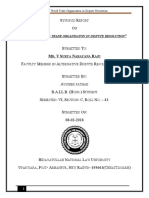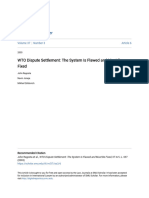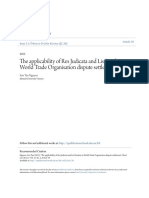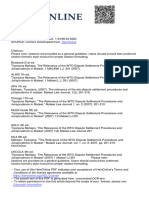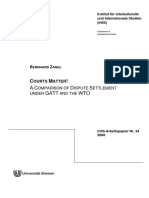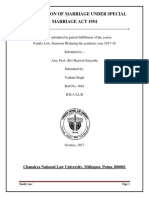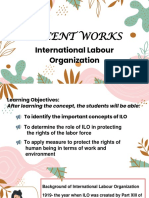International Trade Law
International Trade Law
Uploaded by
bhargavi mishraCopyright:
Available Formats
International Trade Law
International Trade Law
Uploaded by
bhargavi mishraOriginal Description:
Original Title
Copyright
Available Formats
Share this document
Did you find this document useful?
Is this content inappropriate?
Copyright:
Available Formats
International Trade Law
International Trade Law
Uploaded by
bhargavi mishraCopyright:
Available Formats
RESEARCH PROPOSAL
JURISTIC PERSON
Submitted To – Dr. Manorajan Singh
Submitted By – Bhargavi Mishra
Roll no. – 1524
6th Semester, 3rd Year
INTRODUCTION
This Project gives brief idea about Judiciary in WTO and its independence , Across issue areas
as diverse as trade, the environment, and human rights, the international system has become
increasingly legalized. With permanent legal bodies to oversee and enforce a broad range of
international agreements, understanding how international law is adjudicated and enforced is of
critical importance. Although international courts are rarely immune to state influence, the World
Trade Organization (WTO) is often upheld as strong examples of the triumph of legalization and
independence
The judicial function in the WTO agreement can be exercised only in the case for the settlement
of state-to-state disputes. Its sui generis dispute mechanism has jurisdiction only for cases about
whether one WTO Member’s actions violate WTO law or impair trade benefits Thus, the WTO
Agreement provides no right of action by a Member against an administrative action by the
Organization, one of its subsidiary bodies, or the Director-General. This Project looks at whether
judicial independence exists in the WTO or whether it sets high bar for other judicial institutions
of International Organisation.
AIMS AND OBJECTIVES
The objective of this research project is to –
1. To Know about the Provisions for Dispute settlement in WTO
2. Learn about the WTO judicial hierarchy.
3. To examine the procedure of selection of panels of judges.
4. To critically examine the interdependence of WTO DSB with political influence.
HYPOTHESIS
The dispute settlement process of WTO is independent of Political influence.
RESEARCH METHODOLOGY
This study involves the use of doctrinal method of research. The information will be gleaned
from various books on the subject of Jurisprudence and Legal Rights, articles and published
research works.
TENTATIVE CHAPTERISATION
1. INTRODUCTION
2. DISPUTE SETTLEMENT RESOLUTION: OVERVIEW
3. PARTIES TO DISPUTE SETTLEMENT
4. LIMITATION OF WTO DISPUTE SETTLEMENT RESOLUTION
5. CRTICAL ASSESSEMENT OF INDEPENDENCE AND WORKING OF DISPUTE
SETTLEMENT PROCESS.
6. CONCLUSION AND SUGGESTION
BIBLIOGRAPHY
1. Gregory Shaffer and Ricardo Melendez-Ortiz (eds.), Dispute Settlement at the WTO: The Developing
Country Experience (Cambridge University Press, Cambridge, 2010).
2. M B Rao and Manjula Guru, WTO Dispute Settlement and Developing Countries (LexisNexis, New
Delhi, 2004).
3. Mitsuo Matsushita, Thomas J. Schoenbaum, The World Trade Organization- Law, Practice and Policy
(Oxford University Press, New York, 2nd edn., 2006).
4. Surendra Bhandari, World Trade Organisation and Developing Countries (Deep & DeepPublications Pvt.
Ltd., 2001)
You might also like
- Connecticut Practice Book: OfficialDocument597 pagesConnecticut Practice Book: OfficialsoundthecallNo ratings yet
- Joinder in International Commercial Arbitration PDFDocument27 pagesJoinder in International Commercial Arbitration PDFisadora pazNo ratings yet
- Final Draft of Research Proposal For The Partial Fulfillment of Jurisprudence IiDocument33 pagesFinal Draft of Research Proposal For The Partial Fulfillment of Jurisprudence Iibhargavi mishraNo ratings yet
- Emory Law Torts OutlineDocument9 pagesEmory Law Torts OutlineSamantha FeldNo ratings yet
- Comparative Law OutlineDocument25 pagesComparative Law OutlineDawn J. Owens100% (2)
- Avishek ADR ProjectDocument26 pagesAvishek ADR ProjectAvishek PathakNo ratings yet
- Avishek ADR ProjectDocument26 pagesAvishek ADR ProjectAvishek PathakNo ratings yet
- The Domain of WTO ResolutionDocument36 pagesThe Domain of WTO ResolutionfabriciosdNo ratings yet
- WTO Dispute Settlement - The System Is Flawed and Must Be FixedDocument57 pagesWTO Dispute Settlement - The System Is Flawed and Must Be Fixeddiksha chouhanNo ratings yet
- PLDN MidDocument18 pagesPLDN Midtranthungan2806No ratings yet
- Articles Review - WTODocument8 pagesArticles Review - WTOvanshikanikhanjNo ratings yet
- WTO and Human RightsDocument9 pagesWTO and Human RightsDeepti GautamNo ratings yet
- Minority Opinions in The WTo Dispute SettlementDocument29 pagesMinority Opinions in The WTo Dispute SettlementTanisha AgrawalNo ratings yet
- 6 Independence - WG6Document18 pages6 Independence - WG6Ha Nguyen Thi ThuNo ratings yet
- The Bodies Involved in WTO Dispute Settlement SystemDocument7 pagesThe Bodies Involved in WTO Dispute Settlement SystemAkbar Ali SkNo ratings yet
- Rights of Action For Private Non-State Actors in The WTO Disputes-5Document26 pagesRights of Action For Private Non-State Actors in The WTO Disputes-5phuongntgen15.lccNo ratings yet
- The Applicability of Res Judicata and Lis Pendens in World Trade Organisation Dispute SettlementDocument45 pagesThe Applicability of Res Judicata and Lis Pendens in World Trade Organisation Dispute SettlementakisNo ratings yet
- 2019ballb35 - Int'l Commercial ArbDocument14 pages2019ballb35 - Int'l Commercial ArbthatnerdkiddoNo ratings yet
- H R & WTO: Uman IghtsDocument5 pagesH R & WTO: Uman IghtsRishabh kumarNo ratings yet
- Developing Countries and WTO Dispute SettlementDocument15 pagesDeveloping Countries and WTO Dispute SettlementutpulsarNo ratings yet
- Animation of ChoiceDocument9 pagesAnimation of ChoiceAliAwaisNo ratings yet
- Damodaram Sanjivayya National Law University Visakhapatnam, A.P., IndiaDocument19 pagesDamodaram Sanjivayya National Law University Visakhapatnam, A.P., Indiajaswanth siramNo ratings yet
- Adultery ComparisonDocument62 pagesAdultery Comparisonrahil kaziNo ratings yet
- Plue401 MidtermDocument20 pagesPlue401 Midtermtranthungan2806No ratings yet
- DissertationDocument27 pagesDissertationWilmore Tendai Hasan ChisiiwaNo ratings yet
- 1 Malawi LJ201Document20 pages1 Malawi LJ201aishwaryanair22271No ratings yet
- Project WTODocument40 pagesProject WTOMeghaa WaderaNo ratings yet
- Preclass 3Document10 pagesPreclass 3Ngọc DuyênNo ratings yet
- Implications of WTO Litigation For The WTO Agricultural NegotiationsDocument23 pagesImplications of WTO Litigation For The WTO Agricultural NegotiationsDisha AroraNo ratings yet
- Wto Gatt Dispute Settlment MechanismDocument38 pagesWto Gatt Dispute Settlment MechanismRupesh Narayan GuravNo ratings yet
- Bahasa Inggris HukumDocument6 pagesBahasa Inggris HukumMario ChristopherNo ratings yet
- 1 PIL FinalDocument10 pages1 PIL FinalYashvardhan sharmaNo ratings yet
- SSRN Id2467272Document12 pagesSSRN Id2467272Samuel HoNo ratings yet
- Alternative Dispute Resolution Mechanisms and Criminal CasesDocument18 pagesAlternative Dispute Resolution Mechanisms and Criminal CasesSurbhi GuptaNo ratings yet
- International Diplomacy 2023Document25 pagesInternational Diplomacy 2023warren chris bulimeNo ratings yet
- Brazil ArbitrationDocument44 pagesBrazil ArbitrationzwfugkkpNo ratings yet
- ICA AaryaDocument10 pagesICA AaryaVenu GopalNo ratings yet
- TRADE LAW Dispute IIIDocument17 pagesTRADE LAW Dispute IIIMrīgendra Narayan UpadhyayNo ratings yet
- Trade Law Reserach PaperDocument14 pagesTrade Law Reserach PaperRuchi sharmaNo ratings yet
- International Trade LawDocument17 pagesInternational Trade LawAbhinav SinghNo ratings yet
- Research Paper of PIL by Vishesh Singh 500076222Document11 pagesResearch Paper of PIL by Vishesh Singh 500076222Ujjwal MauryaNo ratings yet
- Law in International Commercial ArbitrationDocument40 pagesLaw in International Commercial ArbitrationReyLeonNo ratings yet
- A Crumbling WTODocument26 pagesA Crumbling WTOPee KachuNo ratings yet
- 3 - An Empirical Study On Dispute Resolution Methods (DRM) From The Perspective of Employee and EmployerDocument17 pages3 - An Empirical Study On Dispute Resolution Methods (DRM) From The Perspective of Employee and EmployerAhmed A. M. Al-AfifiNo ratings yet
- Universal Tunis Consultation Publications Seminar and Conference Report 2016 ENGDocument18 pagesUniversal Tunis Consultation Publications Seminar and Conference Report 2016 ENGManya JainNo ratings yet
- Research Paper On Settlement of International Commercial DisputesDocument16 pagesResearch Paper On Settlement of International Commercial Disputesgalgadot.1202No ratings yet
- Assignment On International Humanitarian Law: Analysis of International Judicial SystemDocument24 pagesAssignment On International Humanitarian Law: Analysis of International Judicial SystemNitin ToppoNo ratings yet
- Treaty InterpretationDocument14 pagesTreaty InterpretationElenaLazarNo ratings yet
- Presentation International Law Gr10-Ibl0603Document5 pagesPresentation International Law Gr10-Ibl0603giang nguyenNo ratings yet
- The Two Constitutional Visions of The World Trade OrganizationDocument75 pagesThe Two Constitutional Visions of The World Trade Organizationjikhan552036No ratings yet
- Is WTO Dispute Settlement Effective?Document20 pagesIs WTO Dispute Settlement Effective?Sumitkumar SumanNo ratings yet
- D - R M L N L U, L S - 2018-19: R AM Anohar Ohiya Ational AW Niversity Ucknow EssionDocument4 pagesD - R M L N L U, L S - 2018-19: R AM Anohar Ohiya Ational AW Niversity Ucknow EssionAnubhav VermaNo ratings yet
- The Evolution and Purpose of Private International Law in The Post-War EraDocument13 pagesThe Evolution and Purpose of Private International Law in The Post-War EraUzair JunaidNo ratings yet
- Public International Law - Project WTO and Dispute SettlementDocument39 pagesPublic International Law - Project WTO and Dispute SettlementMitha Sudhindran75% (4)
- Peaceful Settlement of Disputes in International LawDocument11 pagesPeaceful Settlement of Disputes in International LawOlgica StefanovskaNo ratings yet
- Esserman WTOTrial 2003Document12 pagesEsserman WTOTrial 2003saksham gadiaNo ratings yet
- Jurisdiction and Powers of Arbitral Award: Who DecidesDocument18 pagesJurisdiction and Powers of Arbitral Award: Who DecidesDerick HezronNo ratings yet
- w1 - Higgins - Law 9780198764106 Chapter 1Document14 pagesw1 - Higgins - Law 9780198764106 Chapter 1dara.anelsyaNo ratings yet
- Lecture 3 - Slide 15 - WTO Interactions With Other OrganisationsDocument2 pagesLecture 3 - Slide 15 - WTO Interactions With Other OrganisationsJad ZoghaibNo ratings yet
- Comparison and Evaluation of Commercial Mediation With Other Types of Dispute Resolution MechanismsDocument19 pagesComparison and Evaluation of Commercial Mediation With Other Types of Dispute Resolution Mechanismsazizkhan08881No ratings yet
- ΙΔ ΑΥΤΟΝΟΜΙΑ ΕΡΓΑΣΙΑDocument6 pagesΙΔ ΑΥΤΟΝΟΜΙΑ ΕΡΓΑΣΙΑkaldisalexNo ratings yet
- WTO Dispute Settlement MechanismDocument17 pagesWTO Dispute Settlement MechanismTushar GuptaNo ratings yet
- Corporate Crime and Punishment: The Politics of Negotiated Justice in Global MarketsFrom EverandCorporate Crime and Punishment: The Politics of Negotiated Justice in Global MarketsNo ratings yet
- PIL HANDOUT in TextDocument173 pagesPIL HANDOUT in Textbhargavi mishraNo ratings yet
- Two Days International Seminar On Challenges and Prospects of ADR On 14 & 15 June, 2019 at The Indian Law Institute, New DelhiDocument5 pagesTwo Days International Seminar On Challenges and Prospects of ADR On 14 & 15 June, 2019 at The Indian Law Institute, New Delhibhargavi mishraNo ratings yet
- Literary Events: 1. Kavyanjali (Slam Poetry)Document3 pagesLiterary Events: 1. Kavyanjali (Slam Poetry)bhargavi mishraNo ratings yet
- Uttar Pradesh Prevention of Cow Slaughter Act, 1955Document5 pagesUttar Pradesh Prevention of Cow Slaughter Act, 1955bhargavi mishraNo ratings yet
- Investment Law Midsem QuestionDocument8 pagesInvestment Law Midsem Questionbhargavi mishraNo ratings yet
- Q3 IS Listing A Statutory Requirement? Which Type of Companies Are Required To Seek Enlistment?Document4 pagesQ3 IS Listing A Statutory Requirement? Which Type of Companies Are Required To Seek Enlistment?bhargavi mishraNo ratings yet
- Registeration of Marriages in India: A Project Proposal Made byDocument21 pagesRegisteration of Marriages in India: A Project Proposal Made bybhargavi mishraNo ratings yet
- Q-What Are The Steps Taken by SEBI To Protect Investors in The Primary Market?Document4 pagesQ-What Are The Steps Taken by SEBI To Protect Investors in The Primary Market?bhargavi mishraNo ratings yet
- Art of Not Caring, StocismDocument2 pagesArt of Not Caring, Stocismbhargavi mishraNo ratings yet
- Microsoft Office TroublesDocument1 pageMicrosoft Office Troublesbhargavi mishraNo ratings yet
- Meaning and Types of Persons: A Research Proposal Submitted in Partial Fulfillment of Jurisprudence-IIDocument4 pagesMeaning and Types of Persons: A Research Proposal Submitted in Partial Fulfillment of Jurisprudence-IIbhargavi mishraNo ratings yet
- CMV: Parents Who Allow Their Children To Become Morbidly Obese at A Young Age Should Be Subjected To Some Sort of Intervention or ConsequencesDocument1 pageCMV: Parents Who Allow Their Children To Become Morbidly Obese at A Young Age Should Be Subjected To Some Sort of Intervention or Consequencesbhargavi mishraNo ratings yet
- Insurance Breach of WarrantyDocument7 pagesInsurance Breach of Warrantybhargavi mishraNo ratings yet
- Section 45, Nikesh Shah JudgementDocument9 pagesSection 45, Nikesh Shah Judgementbhargavi mishraNo ratings yet
- Phrasal - Verb - Docx Filename - UTF-8''phrasal VerbDocument13 pagesPhrasal - Verb - Docx Filename - UTF-8''phrasal Verbbhargavi mishraNo ratings yet
- 1 Hale, History of The Pleas of The Crown 629 (1778)Document2 pages1 Hale, History of The Pleas of The Crown 629 (1778)bhargavi mishraNo ratings yet
- Project Work of HRMDocument33 pagesProject Work of HRMbhargavi mishraNo ratings yet
- Expulsion of Partners Under Indian Partnership ActDocument15 pagesExpulsion of Partners Under Indian Partnership Actbhargavi mishraNo ratings yet
- Research Proposal General Provisions of Interpretation of Arbitration ACT, 1996Document31 pagesResearch Proposal General Provisions of Interpretation of Arbitration ACT, 1996bhargavi mishraNo ratings yet
- Corporate Law ProjectDocument15 pagesCorporate Law Projectbhargavi mishraNo ratings yet
- Research Project: Submitted in Partial Fulfillment of Labour Laws IiDocument21 pagesResearch Project: Submitted in Partial Fulfillment of Labour Laws Iibhargavi mishraNo ratings yet
- Registration of Marriage Under Special Marriage Act 1954: Chanakya National Law University, Mithapur, Patna, 800001Document21 pagesRegistration of Marriage Under Special Marriage Act 1954: Chanakya National Law University, Mithapur, Patna, 800001bhargavi mishraNo ratings yet
- Rights of An Arrested Person in IndiaDocument24 pagesRights of An Arrested Person in Indiabhargavi mishra100% (1)
- What Is Your Personal Opinion On Death PenaltyDocument2 pagesWhat Is Your Personal Opinion On Death Penaltymaseille bayumbonNo ratings yet
- CONSEQUENTIALISMDocument10 pagesCONSEQUENTIALISMDr. Shipra DikshitNo ratings yet
- Property RegimeDocument3 pagesProperty RegimeMissMsrhNo ratings yet
- The 21st Amendment and Military Courts in PakistanDocument7 pagesThe 21st Amendment and Military Courts in Pakistanjusnrem aINo ratings yet
- Common Law and Civil Law Legal Systems ComparedDocument2 pagesCommon Law and Civil Law Legal Systems ComparedTame AvaaNo ratings yet
- Ethics Grossly ImmoralDocument32 pagesEthics Grossly ImmoralElla QuiNo ratings yet
- Ncm-120-Week-4-Decent WorksDocument28 pagesNcm-120-Week-4-Decent Worksyuuki konnoNo ratings yet
- Democracy in Latin America? An AssesmentDocument12 pagesDemocracy in Latin America? An Assesmentstyvasio2055No ratings yet
- What Do You Understand by The Term Administrative Discretion?Document19 pagesWhat Do You Understand by The Term Administrative Discretion?Azeem ChaudharyNo ratings yet
- Lesson 5 Competence Compellability of Witnesses PDFDocument54 pagesLesson 5 Competence Compellability of Witnesses PDFBoss CKNo ratings yet
- Sources of Kenya Laws-Modified For CCM On 26-04-2011Document22 pagesSources of Kenya Laws-Modified For CCM On 26-04-2011msagaliwa25% (4)
- Law On Partnership Reviewer Law On Partnership ReviewerDocument16 pagesLaw On Partnership Reviewer Law On Partnership ReviewerYatar, JolinaNo ratings yet
- Name - Class - Sub - : Rupam Mandal (Lateral Entry) Eiectrical 3 Sem, Year-2 Indian Constitution (Assigment)Document6 pagesName - Class - Sub - : Rupam Mandal (Lateral Entry) Eiectrical 3 Sem, Year-2 Indian Constitution (Assigment)RupamNo ratings yet
- The SOGIE Equality BillDocument2 pagesThe SOGIE Equality BillNikko Manio100% (1)
- 1 Hale, History of The Pleas of The Crown 629 (1778)Document2 pages1 Hale, History of The Pleas of The Crown 629 (1778)bhargavi mishraNo ratings yet
- Institutional and Non Institutional Correction PDF FreeDocument10 pagesInstitutional and Non Institutional Correction PDF FreeJaime CabicoNo ratings yet
- BIL05PDocument30 pagesBIL05PAngel WilliamNo ratings yet
- B.B.A. LLB Enrollment Number Name TopicsDocument4 pagesB.B.A. LLB Enrollment Number Name TopicsSamraat SinghNo ratings yet
- Judicial Counter-Affidavit of Nicole Leonor Atilano PonDocument5 pagesJudicial Counter-Affidavit of Nicole Leonor Atilano PonJojo Navarro100% (1)
- Access To Justice and Legal AidDocument17 pagesAccess To Justice and Legal Aidkbvkrishnamurty100% (1)
- The Judge's DecisionDocument3 pagesThe Judge's DecisionAhvzk AaeyjNo ratings yet
- KohlbergDocument5 pagesKohlbergIan Dante ArcangelesNo ratings yet
- Adultery Law in IndiaDocument2 pagesAdultery Law in IndiaApple MudasirNo ratings yet
- John Stuart Mill: Jake, Maria, Stuart & TommyDocument27 pagesJohn Stuart Mill: Jake, Maria, Stuart & TommyMalibog AkoNo ratings yet
- Loizidou Vs Turkey CaseDocument5 pagesLoizidou Vs Turkey CaseJenny Arcenas100% (1)
- The Meaning of LawDocument6 pagesThe Meaning of LawFirman Hamdan100% (1)
- United Nations Human Rights Defenders DeclarationDocument82 pagesUnited Nations Human Rights Defenders DeclarationNAFSONo ratings yet






